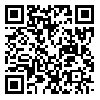Volume 17, Issue 1 (3-2024)
IJMEHM 2024, 17(1): 116-129 |
Back to browse issues page
Download citation:
BibTeX | RIS | EndNote | Medlars | ProCite | Reference Manager | RefWorks
Send citation to:



BibTeX | RIS | EndNote | Medlars | ProCite | Reference Manager | RefWorks
Send citation to:
Zarei-fard N, Ebrahimi S. New Ethical Principles in the Dissection Hall: A Brief Overview of the History of Ethical Developments. IJMEHM 2024; 17 (1) : 8
URL: http://ijme.tums.ac.ir/article-1-6704-en.html
URL: http://ijme.tums.ac.ir/article-1-6704-en.html
1- Associate Professor, Department of Anatomical Sciences, Faculty of Medicine, Shiraz University of Medical Sciences, Shiraz, Iran
2- Professor, Pediatrician, Department of Medical Ethics and Philosophy of Health, Faculty of Medicine, Shiraz University of Medical Sciences, Shiraz, Iran
2- Professor, Pediatrician, Department of Medical Ethics and Philosophy of Health, Faculty of Medicine, Shiraz University of Medical Sciences, Shiraz, Iran
Abstract: (603 Views)
Medical science and ethics form an integral part of medical curricula. Cadaver dissection is the preferred educational tool in the early stages of medical education which provides a suitable opportunity to sow the seeds of medical ethics in the minds of future physicians. This review study aimed to investigate unethical events in the history of dissection and subsequent ethical evolutions in human dissection to highlight the need to uphold the ethical values related to donor bodies in the dissection hall. To find and evaluate related documents, the articles published from 2005 to 2023 were searched in Scopus, PubMed, Google Scholar, and Research Gate databases using relevant keywords. The results indicated that in the past, cadaver dissection was performed on the bodies of executed criminals or through illegal methods, and until the early 1960s, the ethical principle of respect for autonomy was overlooked. However, from the 20th century onwards, the use of donated bodies with informed consent became prominent, allowing universities in the 21st century to utilize this resource for education, thereby providing an acceptable solution to fill the ethical gaps in dissection. Clarifying the ethical standards associated with the use of donated bodies is essential for medical students. The human body represents a valuable scientific resource that warrants respectful treatment following established ethical guidelines and laws. Adhering to the highest ethical standards within educational institutions is necessary to ensure donors feel confident in their decisions.
Article number: 8
Keywords: Body donation, Human body dissection, History of ethics, cadaver, Ethical standards, Dignity of donor
Type of Study: Review |
Subject:
Medical Ethics
Received: 2024/04/26 | Accepted: 2024/08/27 | Published: 2024/03/20
Received: 2024/04/26 | Accepted: 2024/08/27 | Published: 2024/03/20
| Rights and permissions | |
 |
This work is licensed under a Creative Commons Attribution-NonCommercial 4.0 International License. |





